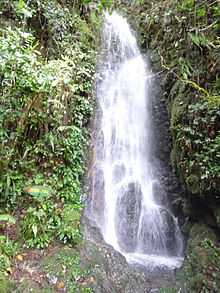National Ambient Air Quality Standards

The National Ambient Air Quality Standards (NAAQS) are standards established by the United States Environmental Protection Agency under authority of the Clean Air Act (42 U.S.C. 7401 et seq.) that apply for outdoor air throughout the country. Primary standards are designed to protect human health, with an adequate margin of safety, including sensitive populations such as children, the elderly, and individuals suffering from respiratory diseases. Secondary standards are designed to protect public welfare from any known or anticipated adverse effects of a pollutant. A district meeting a given standard is known as an "attainment area" for that standard, and otherwise a "non-attainment area".[1]
Standards
The standards are listed in 40 C.F.R. 50.
| Pollutant | Type | Standard | Averaging Timea | Regulatory Citation |
|---|---|---|---|---|
| SO2 | Primary | 75 ppb | 1-hour | 40 C.F.R. 50.4b |
| SO2 | Secondary | 0.5 ppm (1,300 μg/m³) | 3-hour | 40 C.F.R. 50.5a |
| PM10 | Primary and Secondary | 150 μg/m³ | 24-hour | 40 C.F.R. 50.6a |
| PM2.5 | Primary and Secondary | 65 μg/m³ | 24-hour | 40 C.F.R. 50.7a |
| PM2.5 | Primary and Secondary | 15 μg/m³c | annual | 40 C.F.R. 50.7a |
| CO | Primary | 35 ppm (40 mg/m³) | 1-hour | 40 C.F.R. 50.8a(2) |
| CO | Primary | 9 ppm (10 mg/m³) | 8-hour | 40 CFR 50.8(a)(1) |
| O3 | Primary and Secondary | 0.12 ppm (235 μg/m³) | 1-hourb | 40 CFR 50.9(a) |
| O3 | Primary and Secondary | 0.075 ppm (150 μg/m³) | 8-hour | 40 CFR 50.10(a) |
| NO2 | Primary and Secondary | 0.053 ppm (100 μg/m³) | annual | 40 CFR 50.11(a) and (b) |
| Pb | Primary and Secondary | 0.15 μg/m³ | Rolling 3 months | 40 CFR 50.12 |
- ^a Each standard has its own criteria for how many times it may be exceeded, in some cases using a three year average.
- ^b As of June 15, 2005, the 1-hour ozone standard no longer applies to areas designated with respect to the 8-hour ozone standard (which includes most of the United States, except for portions of 10 states).
- ^c As of December 2014, the primary fine particulate standard will be 12.0 μg/m³.[2]
- Source: USEPA
Air quality control region
An air quality control region is an area, designated by the federal government, where communities share a common air pollution problem. [3]
See also
- Air pollution
- Air Quality Index
- Asthma
- Atmospheric dispersion modeling
- Clean Air Act (1990)
- Portable Emissions Measurement System
- Toxic Substances Control Act of 1976
References
- ↑ Trans-Alaska Pipeline System Renewal Environmental Impact Statement article
- ↑ http://www.epa.gov/pm/2012/decfsoverview.pdf
- ↑ "EPA document".
External links
- EPA summary of the National Ambient Air Quality Standards
- EPA summary for Air & Radiation
- EPA Green Book showing non-attainment, maintenance, and attainment areas
- Most Polluted Cities, 2005 - American Lung Association
| |||||||||||||||||||||||||||||||||||||||||||||||||||||||
